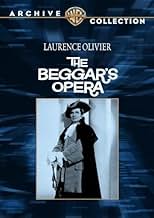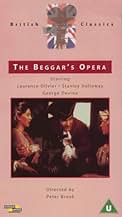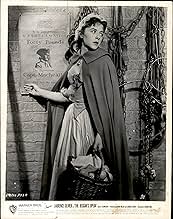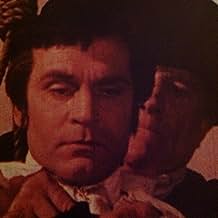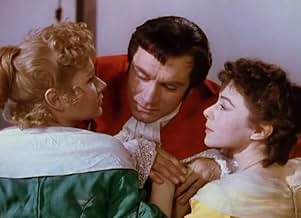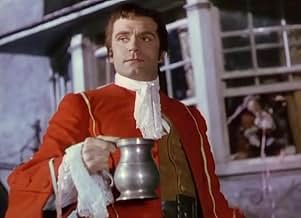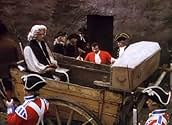NOTE IMDb
6,1/10
413
MA NOTE
Ajouter une intrigue dans votre langueWhen the composer of an opera about a swashbuckling, wenching highwayman meets his hero's real-life counterpart, he's disappointed with his lack of dash.When the composer of an opera about a swashbuckling, wenching highwayman meets his hero's real-life counterpart, he's disappointed with his lack of dash.When the composer of an opera about a swashbuckling, wenching highwayman meets his hero's real-life counterpart, he's disappointed with his lack of dash.
- Réalisation
- Scénario
- Casting principal
Avis à la une
While this is an adequate rendering of the famous John Gay mock opera, it suffers from having Olivier sing the entire role in his own untrained voice. After a while his vocalism grows wearisome, having a slight flat and dull quality to his tone.
Brook's direction is also lacking; in trying to open the action up on screen, it looks somewhat forced and off balance. This is still a good film, all things considered and the fact that it's a rare filming of this work.
So in the end we give it a grade of B, and hope a better version will subsequently be made.
Brook's direction is also lacking; in trying to open the action up on screen, it looks somewhat forced and off balance. This is still a good film, all things considered and the fact that it's a rare filming of this work.
So in the end we give it a grade of B, and hope a better version will subsequently be made.
The sad fact about "The Beggar's Opera" is that it wasn't directed by Powell and Pressburger. If this had been the case it would no doubt be lauded today as an eccentric masterpiece. It shared the same fate of critical disdain in its time as "Gone to Earth" and "The Elusive Pimpernel" but, unlike these, has still to await an appreciative resurrection. Could it be that it was made by the comparatively little known Peter Brook! And yet with its colourful visual flair and sometimes breathtaking sense of movement it seems right out of the same stable as "The Tales of Hoffmann" and "Oh Rosalinda!". A wonderfully imaginative shot of the landscape viewed from the scaffold gradually blacked out as the prisoner's blindfold is lowered over MacHeath's eyes is perhaps the best example of its inventiveness. For the musical purist it is inevitably something of a curiosity. A fine cast of contemporary singers including Adele Leigh, Jennifer Vyvyan and Edith Coates were assembled to dub the acting cast for the musical numbers, whereas the main role of MacHeath was sung by Laurence Oliver himself, his light baritone voice, although no match for the others, at least serviceable. But, as it works perfectly well, why quibble. (I have little time for those who criticised the "amateur" voices of Woody Allen's delicious musical "Everyone Says I Love You" as they so matched the characters and were not in the least, as has been suggested, unmusical). I watched "The Beggar's Opera" again the other day after a gap of over 50 years and found it just as refreshing. One of the reasons is that many of the tunes are terrific and not one of them goes on for too long. Generally I have to confess that I have little time for filmed musicals. I invariably want the songs to be got over as quickly as possible in order to get on with the action, which I know completely misses the point. With "The Beggar's Opera" I find the reverse to be true, just about resisting the temptation to fast-forward the dialogue to get to the next "tune". Sir Arthur Bliss did a wonderful job of arranging the music specially for the film version although it has to be admitted that the sound quality of the copy transmitted on Sky's Artsworld channel was often muddy and unclear. Would that the soundtrack could be remastered!
This was a very enjoyable movie especially if you like period pieces and/or musicals. Hearing Laurence Olivier sing is reason enough to watch this. The cinematography is outstanding and the movie as a whole is very colorful.
Obviously, the song "Mack the Knife" made famous by Bobby Darin, Louis Armstrong and Frank Sinatra is based on this opera/movie. MacHeath is in the opera/movie as is Jenny Diver and Sukey Tawdrey. Louie Miller, Lotte Lenya and Lucy Brown are mentioned in the song (and not in the opera/movie) but, after all, MacHeath was a notorious highwayman and ladies' man.
Obviously, the song "Mack the Knife" made famous by Bobby Darin, Louis Armstrong and Frank Sinatra is based on this opera/movie. MacHeath is in the opera/movie as is Jenny Diver and Sukey Tawdrey. Louie Miller, Lotte Lenya and Lucy Brown are mentioned in the song (and not in the opera/movie) but, after all, MacHeath was a notorious highwayman and ladies' man.
As was said in my review for the 1963 production of the Britten version, John Gay's ballad/satirical opera 'The Beggar's Opera' is a lot of fun and it is no wonder it's popular with most, the dialogue, music and characters are all great. Benjamin Britten's radically different but enormously enjoyable and melodious, an ingenious and often brilliant modern re-imagining that shows the composer's individual treatment of folk-songs, version is also well worth it as well.
This 1953 film may not be completely ideal, but it is still intriguing and entertaining with a good deal to like. Occasionally, some of the dialogue loses impact when director Peter Brook tries to open up the action. While there are wonderful, imaginative visuals, Brook's directorial inexperience shows with some of the drama a bit undistinguished and stagy.
However, 'The Beggar's Opera' (1953) is a very handsome-looking film, with stylish production and costume design and some imaginative photography that succeeds in opening up the action. The music is a superb mix of rousing fun and heartfelt nuance. Most of the dialogue crackles with sharp wit and avoids being too wordy.
Most of the story absorbs and is lively in pacing, with the action being just about easy to follow and the twist is well executed.
Laurence Olivier may not have the best singing voice there is, but has charismatic swagger and energy aplenty. Hugh Griffith, Dorothy Tutin, George Devine and Stanley Holloway give him strong support.
All in all, intriguing and entertaining if not the most ideal version. 7/10 Bethany Cox
This 1953 film may not be completely ideal, but it is still intriguing and entertaining with a good deal to like. Occasionally, some of the dialogue loses impact when director Peter Brook tries to open up the action. While there are wonderful, imaginative visuals, Brook's directorial inexperience shows with some of the drama a bit undistinguished and stagy.
However, 'The Beggar's Opera' (1953) is a very handsome-looking film, with stylish production and costume design and some imaginative photography that succeeds in opening up the action. The music is a superb mix of rousing fun and heartfelt nuance. Most of the dialogue crackles with sharp wit and avoids being too wordy.
Most of the story absorbs and is lively in pacing, with the action being just about easy to follow and the twist is well executed.
Laurence Olivier may not have the best singing voice there is, but has charismatic swagger and energy aplenty. Hugh Griffith, Dorothy Tutin, George Devine and Stanley Holloway give him strong support.
All in all, intriguing and entertaining if not the most ideal version. 7/10 Bethany Cox
The Beggar's Opera has so much going for it. The author, John Gay placed it squarely in an underworld of thieves, whores, liars, drunkards, double-crossers, and corrupt officials. He gave them a witty voice, where moral values are reversed, and most importantly he gave them newly worded songs set to recent popular tunes.
The Beggar's Opera continues to be an important work, that has been raided by later writers; most importantly by Brecht who adapted its main elements as The Threepenny Opera; and also by writers such as Dennis Potter (Pennies From Heaven clearly borrows heavily from from The Beggar's Opera, down to the final twist).
This is a film that should work well as a film-of-the-stage, for there is always a sense that the characters are trapped in their little world, in each other's pocket, and all knowing each other's business. But Peter Brook tries to make the film more cinematic by opening the action out in places. Though this is understandable, it entails some unfortunate compromises. The attempt to inject some new life into this film, with primarily visual scenes and a bit of derring-do action, means that Brook is forced to cut the text severely in places, and the strength of the piece lies in the words Gay wrote, not in the pictures that Brook creates. The film works well where the original text survives and the characters are allowed to speak, but that happens rarely. And Brook also messes about with the twist-ending!
In brief, enough survives of the original to make it worth watching, if there's no better alternative.
The Beggar's Opera continues to be an important work, that has been raided by later writers; most importantly by Brecht who adapted its main elements as The Threepenny Opera; and also by writers such as Dennis Potter (Pennies From Heaven clearly borrows heavily from from The Beggar's Opera, down to the final twist).
This is a film that should work well as a film-of-the-stage, for there is always a sense that the characters are trapped in their little world, in each other's pocket, and all knowing each other's business. But Peter Brook tries to make the film more cinematic by opening the action out in places. Though this is understandable, it entails some unfortunate compromises. The attempt to inject some new life into this film, with primarily visual scenes and a bit of derring-do action, means that Brook is forced to cut the text severely in places, and the strength of the piece lies in the words Gay wrote, not in the pictures that Brook creates. The film works well where the original text survives and the characters are allowed to speak, but that happens rarely. And Brook also messes about with the twist-ending!
In brief, enough survives of the original to make it worth watching, if there's no better alternative.
Le saviez-vous
- Anecdotes"The Beggar's Opera" is a ballad opera popular during the early eighteenth century, which used the music of popular folk songs, ballads and church hymns set to new lyrics to satirize social customs, mores, and especially Italian opera. It copied the three act Italian operatic format, rather than the then-custom of five acts.
- Citations
Captain MacHeath: [Hearing a woman singing] Women!... I love the sex!... and a man who loves money might as well be contented with one guinea... as I with one woman.
- Crédits fousUnusually, the ghost vocalists for the non-singing actors were given billing in the end credits.
- ConnexionsFeatured in Carry on Forever: Épisode #1.1 (2015)
Meilleurs choix
Connectez-vous pour évaluer et suivre la liste de favoris afin de recevoir des recommandations personnalisées
Détails
Box-office
- Budget
- 500 000 £GB (estimé)
- Durée
- 1h 34min(94 min)
- Couleur
- Rapport de forme
- 1.37 : 1
Contribuer à cette page
Suggérer une modification ou ajouter du contenu manquant

